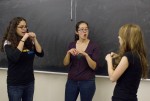Charlie Falconer’s fraternity brothers noticed his diminished hearing before he himself did.
He would often miss the punch line of jokes. Voices over the phone became fainter.
“When I was pledging for the (Phi Kappa Psi) fraternity, I was around the house (with) the guys. They asked (me) to do things and had to repeat themselves. I wouldn’t hear things,” said Falconer, a third-year environmental science student.
Falconer is one of 24 students taking American Sign Language 3: Elementary American Sign Language. It is the last of the series of ASL courses offered to UCLA students as part of a two-year pilot program that began in 2012. The department of linguistics will be offering ASL 4 for the first time in fall 2013, said Kyle McJunkin, director of curriculum coordination and operations of the Undergraduate Education Initiatives.
Listen: Bruins push for expansion of American Sign Language curriculum
As of now, Falconer won’t be able to take ASL 5 and 6 because UCLA does not currently offer the courses. It will take time to establish ASL 5 and 6 because they are structured based on students’ evaluations of current classes, said Benjamin Lewis, an ASL lecturer.
“We don’t promise course offerings until we know that there is a specific demand for them,” McJunkin said. Though enrollment in current ASL classes has been good so far, he said.
Falconer’s condition is caused by neurofibromatosis type II – a disorder that results in the growth of a benign mass along the nerve that carries signals between the brain and the inner ear.
Test results verifying his rapid decrease in hearing ability two years ago prompted his doctor to recommend that he learn the language, Falconer said.
Falconer first encountered American Sign Language in tutoring lessons outside of UCLA during his sophomore year to prepare for the potential further decline in his hearing ability.
“At first, I saw (learning sign language) as more of as a chore,” Falconer said. “It’s not fun to think about losing your hearing.”
Although Falconer’s hearing has improved over the past two years after taking Avastin, a treatment that is on clinical trial for neurofibromatosis type II, he said he initially had a hard time accepting the loss of his hearing.
His hearing is stable now that he is taking the medication, but going deaf is still a possibility, Falconer said.
“I was humiliated, embarrassed (and) self-conscious (because of) the fact that I had to ask people to repeat themselves and had hearing aids,” he said.
After taking Avastin, Falconer is now able to converse on the phone.
“My biggest fear (at first) was a ringing telephone. (At the fraternity house), I would try to ignore (a phone ringing) because I couldn’t hear the other person on the line,” he said. “But if I didn’t answer it, I felt awkward that I was trying to avoid answering the telephone.”
Falconer said that taking ASL classes, starting in fall quarter, is what empowered him to accept his hearing impairment and look upon his condition with a hint of humor. Now, he said he can look back and chuckle at the time when he shot up from his chair and nominated a UCLA student for pledging when the student’s name had already been mentioned.
ASL classes have taught him not only sign language, but also about deaf culture, which has been crucial in understanding what it means to be part of the deaf community, Falconer said.
Despite the challenges of his hearing impairment, Falconer has not lost sight of who he is, said Dominic Fusdo, Falconer’s former fraternity brother and roommate.
“He’s the guy (in our apartment) who calls the maintenance person when the refrigerator is broken,” said Fusdo, a third-year political science and psychology student. “He’s a leader who takes initiative and takes responsibility.”
Patty Falconer, Charlie Falconer’s mother, said that while her son could have lingered on the drawbacks of his diminished hearing, he has not let it affect his enjoyment of life.
Charlie Falconer said he is keen to see a comprehensive ASL program as soon as possible.
“So many things can change in a year. Freshmen year of college, I went from having normal hearing (to) getting hearing aids and starting (treatment). There is a large cost in waiting,” he said about the future of UCLA’s ASL classes. “We want it now.”
